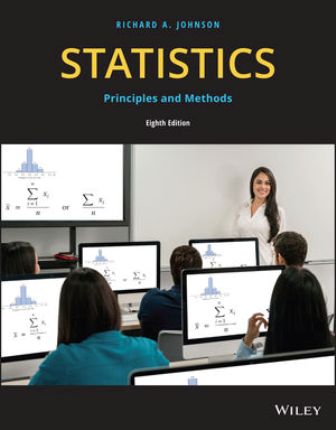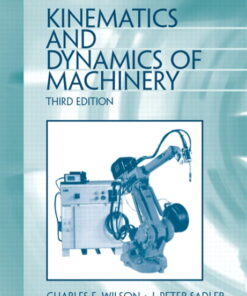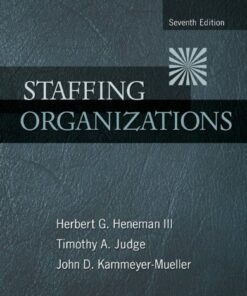Solution Manual for Statistics: Principles and Methods, 8th Edition, Richard A. Johnson, ISBN: 1119497116, ISBN: 9781119497110
$35.00
Solution Manual for Statistics: Principles and Methods, 8th Edition, Richard A. Johnson, ISBN: 1119497116, ISBN: 9781119497110
Solution Manual for Statistics: Principles and Methods, 8th Edition, Richard A. Johnson, ISBN: 1119497116, ISBN: 9781119497110
Table of Contents
1 INTRODUCTION TO STATISTICS 1
1 The Subject and Scope of Statistics 2
2 Statistics in Aid of Scientific Inquiry 4
3 Two Basic Concepts—Population and Sample 6
4 The Purposeful Collection of Data 11
Case Study: Statistics in Context 12
5 Objectives of Statistics 14
2 ORGANIZATION AND DESCRIPTION OF DATA 17
1 Main Types of Data 18
2 Describing Data by Tables and Graphs 19
3 Measures of Center 31
4 Measures of Variation 37
5 Checking the Stability of the Observations over Time 47
6 More on Graphics 50
Case Study: Statistics in Context 52
3 DESCRIPTIVE STUDY OF BIVARIATE DATA 64
1 Summarization of Bivariate Categorical Data 65
2 A Designed Experiment for Making a Comparison 69
3 Scatter Diagram of Bivariate Measurement Data 70
4 The Correlation Coefficient—A Measure of Linear Relation 73
5 Prediction of One Variable from another (Linear Regression) 82
4 PROBABILITY 91
1 Probability of an Event 92
2 Methods of Assigning Probability 97
3 Event Operations and Two Laws of Probability 102
4 Conditional Probability and Independence 109
5 Bayes’ Theorem 117
6 Random Sampling from a Finite Population 121
Case Study: Statistics in Context 126
5 PROBABILITY DISTRIBUTIONS 134
1 Random Variables 135
2 Probability Distribution of a Discrete Random Variable 138
3 Mean (Expected Value) and Standard Deviation of a Probability Distribution 144
4 Successes and Failures—Bernoulli Trials 150
5 The Binomial Distribution 154
6 The Poisson Distribution and Rare Events 165
6 THE NORMAL DISTRIBUTION 178
1 Probability Model for a Continuous Random Variable 179
2 The Normal Distribution—Its General Features 184
3 The Standard Normal Distribution 186
4 Probability Calculations with Normal Distributions 191
5 The Normal Approximation to the Binomial 194
6 Checking the Plausibility of a Normal Model 199
7 Transforming Observations to Attain Near Normality 202
7 VARIATION IN REPEATED SAMPLES—SAMPLING DISTRIBUTIONS 210
1 The Sampling Distribution of a Statistic 212
2 Distribution of the Sample Mean and the Central Limit Theorem 218
Case Study: Statistics in Context 228
8 DRAWING INFERENCES FROM LARGE SAMPLES 235
1 Two Types of Statistical Inference: Estimation and Testing 236
2 Point Estimation of a Population Mean 238
3 Confidence Interval Estimation of a Population Mean 242
4 Testing Hypotheses about a Population Mean 250
5 Inferences about a Population Proportion 261
9 SMALL SAMPLE INFERENCES FOR NORMAL POPULATIONS 278
1 Student’s t Distribution 279
2 Inferences about ??—Small Sample Size 282
3 Relationship between Tests and Confidence Intervals 289
4 Inferences about the Standard Deviation ?? (The Chi-Square Distribution) 291
5 Robustness of Inference Procedures 296
10 COMPARING TWO TREATMENTS 303
1 Two Designs: Independent Samples and Matched Pairs Sample 305
2 Inferences about the Difference of Means—Independent Large Samples 307
3 Inferences about the Difference of Means—Independent Small Samples from Normal Populations 314
4 Randomization and Its Role in Inference 323
5 Matched Pairs Comparisons 325
6 Choosing Between Independent Samples and a Matched Pairs Sample 332
7 Comparing Two Population Proportions 333
11 REGRESSION ANALYSIS I
Simple Linear Regression 349
1 Regression with a Single Predictor 350
2 A Straight Line Regression Model 353
3 The Method of Least Squares 355
4 The Sampling Variability of the Least Squares Estimators—Tools for Inference 362
5 Important Inference Problems 363
6 The Strength of a Linear Relation 373
7 Remarks about the Straight Line Model Assumptions 377
12 REGRESSION ANALYSIS II Multiple Linear Regression and Other Topics 384
1 Nonlinear Relations and Linearizing Transformations 385
2 Multiple Linear Regression 390
3 Residual Plots to Check the Adequacy of a Statistical Model 398
13 ANALYSIS OF CATEGORICAL DATA 408
1 Formulating Testing Problems Concerning Categorical Data 409
2 Pearson’s ?2 Test for Goodness of Fit 411
3 Contingency Table with One Margin Fixed (Test of Homogeneity) 415
4 Contingency Table with Neither Margin Fixed (Test of Independence) 422
14 ANALYSIS OF VARIANCE (ANOVA) 432
1 Comparison of Several Treatments—One-Way Analysis of Variance 433
2 Population Model and Inferences for a One-Way Analysis of Variance 439
3 Simultaneous Confidence Intervals 443
4 Graphical Diagnostics and Displays to Supplement ANOVA 446
5 Randomized Block Experiments for Comparing k Treatments 448
15 NONPARAMETRIC INFERENCE 460
1 The Wilcoxon Rank-Sum Test for Comparing Two Treatments 461
2 Matched Pairs Comparisons 469
3 Measure of Correlation Based on Ranks 475
4 Concluding Remarks 478
APPENDIX A1 SUMMATION NOTATION 483
APPENDIX A2 RULES FOR COUNTING 488
APPENDIX A3 EXPECTATION AND STANDARD DEVIATION—PROPERTIES 490
APPENDIX A4 THE EXPECTED VALUE AND STANDARD DEVIATION OF X 496
APPENDIX B TABLES 498
Table 1 Random Digits 498
Table 2 Cumulative Binomial Probabilities 501
Table 3 Cumulative Poisson Probabilities 507
Table 4 Standard Normal Probabilities 509
Table 5 Percentage Points t?? of t Distributions 511
Table 6 Percentage Points ?2?? of ?2 Distributions 512
Table 7 Percentage Points of F( v1, v2 ) Distributions 513
Table 8 Selected Tail Probabilities for the Null Distribution of Wilcoxon’s Rank-Sum Statistic 515
Table 9 Selected Tail Probabilities for the Null Distribution of Wilcoxon’s Signed-Rank Statistic 520
Table F1 General Formulas for Inferences about a Mean (??), Difference of Two Means ( ??1 – ??2 ) 522
Table F2 Inference about Proportions 523
Summary of Formulas Useful for Exams 524
DATA BANK 530
ANSWERS TO SELECTED ODD-NUMBERED EXERCISES 544
INDEX 557
Be the first to review “Solution Manual for Statistics: Principles and Methods, 8th Edition, Richard A. Johnson, ISBN: 1119497116, ISBN: 9781119497110” Cancel reply
Related products
Solution Manual












Reviews
There are no reviews yet.